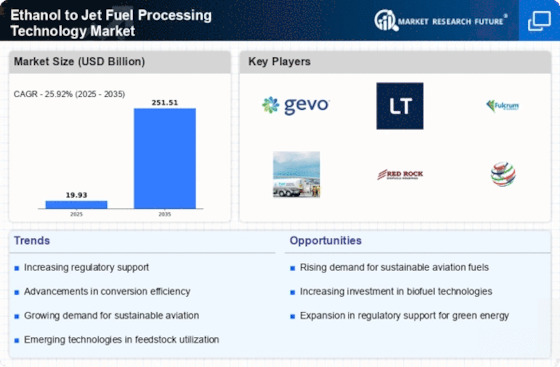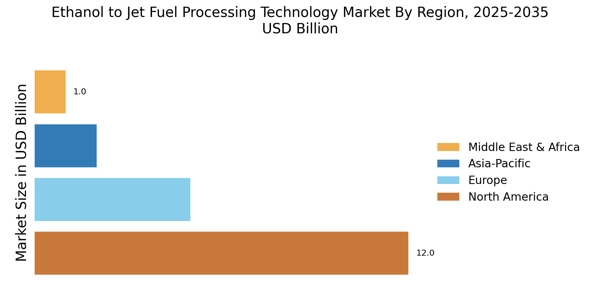Supportive Government Policies and Incentives
Government policies and incentives play a crucial role in shaping the Ethanol To Jet Fuel Etj Processing Technology Market. Many governments are implementing regulations that promote the use of renewable fuels, including ethanol-based jet fuel. These policies often include tax credits, subsidies, and mandates that encourage airlines to adopt sustainable fuel alternatives. For example, some countries have set blending mandates that require a certain percentage of biofuels in aviation fuel. Such supportive measures not only stimulate market growth but also create a favorable environment for research and development in ethanol conversion technologies. As a result, the Ethanol To Jet Fuel Etj Processing Technology Market is likely to expand as these policies gain traction.
Rising Oil Prices and Energy Security Concerns
The Ethanol To Jet Fuel Etj Processing Technology Market is influenced by the volatility of oil prices and the associated energy security concerns. As traditional fossil fuel prices fluctuate, there is a growing incentive for countries to explore alternative fuel sources, including ethanol-derived jet fuel. This trend is particularly evident in regions heavily reliant on oil imports, where energy independence is a strategic priority. The potential for ethanol to provide a stable and domestically sourced fuel option enhances its appeal. Consequently, the Ethanol To Jet Fuel Etj Processing Technology Market is likely to benefit from this shift towards energy diversification and the pursuit of more stable fuel pricing.
Advancements in Ethanol Conversion Technologies
Technological innovations in the conversion of ethanol to jet fuel are significantly impacting the Ethanol To Jet Fuel Etj Processing Technology Market. Recent advancements in catalytic processes and fermentation techniques have improved the efficiency and yield of ethanol conversion, making it a more viable option for jet fuel production. For instance, new catalysts have been developed that enhance the conversion rates, potentially reducing production costs. As these technologies continue to evolve, they are expected to attract further investment and interest from stakeholders in the aviation sector. This progress not only supports the growth of the Ethanol To Jet Fuel Etj Processing Technology Market but also positions it as a competitive alternative to conventional jet fuels.
Increasing Demand for Sustainable Aviation Fuels
The Ethanol To Jet Fuel Etj Processing Technology Market is experiencing a surge in demand for sustainable aviation fuels. Airlines and regulatory bodies are increasingly prioritizing the reduction of carbon emissions, which has led to a heightened interest in alternative fuel sources. According to recent data, the aviation sector aims to achieve net-zero emissions by 2050, prompting investments in technologies that convert ethanol into jet fuel. This shift not only aligns with environmental goals but also meets consumer expectations for greener travel options. As a result, the Ethanol To Jet Fuel Etj Processing Technology Market is poised for growth, driven by the need for cleaner fuel alternatives that can be integrated into existing aviation infrastructure.
Growing Investment in Renewable Energy Infrastructure
Investment in renewable energy infrastructure is a key driver for the Ethanol To Jet Fuel Etj Processing Technology Market. As the world shifts towards sustainable energy solutions, significant capital is being allocated to develop facilities that can produce ethanol and convert it into jet fuel. This trend is evident in various regions where governments and private entities are collaborating to enhance biofuel production capabilities. The establishment of new processing plants and the upgrading of existing facilities are expected to increase the availability of ethanol-derived jet fuel. This influx of investment not only supports the growth of the Ethanol To Jet Fuel Etj Processing Technology Market but also fosters innovation and efficiency in production processes.

















